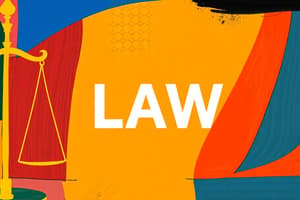Podcast
Questions and Answers
What is law?
What is law?
A body of rules that regulate and control the behavior of people in society.
Legal rules and moral rules are the same.
Legal rules and moral rules are the same.
False (B)
What is one example of a legal wrong?
What is one example of a legal wrong?
Theft
What is the purpose of law in society? (Select all that apply)
What is the purpose of law in society? (Select all that apply)
What are the two broad classifications of law?
What are the two broad classifications of law?
Which of the following is a branch of public law?
Which of the following is a branch of public law?
What is the standard of proof in private law cases?
What is the standard of proof in private law cases?
Match the following branches of law with their descriptions:
Match the following branches of law with their descriptions:
The absence of law leads to _____ in society.
The absence of law leads to _____ in society.
Flashcards are hidden until you start studying
Study Notes
Introduction to Law
- Laws are rules that govern our behaviour in society.
- They are made and enforced by various institutions
- The origins of law can be traced to ancient traditions, religious texts, and societal needs.
- Law stems from the perception of what is right and wrong within a community.
- Legal rules are backed by sanctions, unlike moral rules, which have consequences for non-compliance.
- Moral hazards exist in insurance practice, which are situations where individuals might behave differently due to the existence of insurance.
The Purpose of Law
- The legal system ensures an orderly society and regulates the economy.
- Laws protect individual rights and liberties, ensuring that peaceful dispute resolution is possible.
- The legal system safeguards personal property and lives.
- Its role in society is to maintain peace, ensure order, and provide justice.
Classifications of Law
- Public Law
- Focuses on the legal structure of the state.
- Regulates the relationship between states and individuals.
- Consists of:
- Criminal Law: Deals with acts that harm the community. Examples include theft, murder, and rape. The state prosecutes individuals who break these laws, and punishments vary. The standard of proof is “beyond reasonable doubt.”
- Constitutional Law: Sets out the framework of the state and defines the powers of its institutions.
- Administrative Law: Governs the relationship between the government and its citizens.
- Private Law
- Often called civil law.
- Focuses on the relationships between individuals.
- Deals with the violation of individual rights.
- The plaintiff (the person bringing the lawsuit) tries to get compensation from the defendant (the person being sued).
- The standard of proof is a “balance of probabilities.”
- Consists of:
- Contract Law: Deals with agreements between individuals.
- Tort Law: Deals with civil wrongs (e.g. negligence, defamation, etc.)
- Succession Law: Deals with the transfer of property after death
- Trust Law: Deals with agreements where one person manages property for another.
- Family Law: Deals with aspects of marriage, divorce, and children.
- Property Law: Deals with ownership and control of property.
- International Law:
- Governs relationships between different states.
- Divided between:
- Public International Law: Deals with treaties, conventions, and international organizations.
- Private International Law: Applies when a legal matter involves people or entities from different countries (e.g., international contracts).
- Municipal Law:
- Also known as domestic law.
- This is the law of a specific state or nation.
- Procedural Law:
- Outlines rules that determine how legal cases will proceed in court.
- Defines the processes, steps, and legal requirements that must be followed.
- Substantive Law:
- Focuses on the rights, duties, and responsibilities of individuals, and the rules for creating contracts and establishing legal frameworks.
- Defines the actual legal content and the laws themselves.
Studying That Suits You
Use AI to generate personalized quizzes and flashcards to suit your learning preferences.




